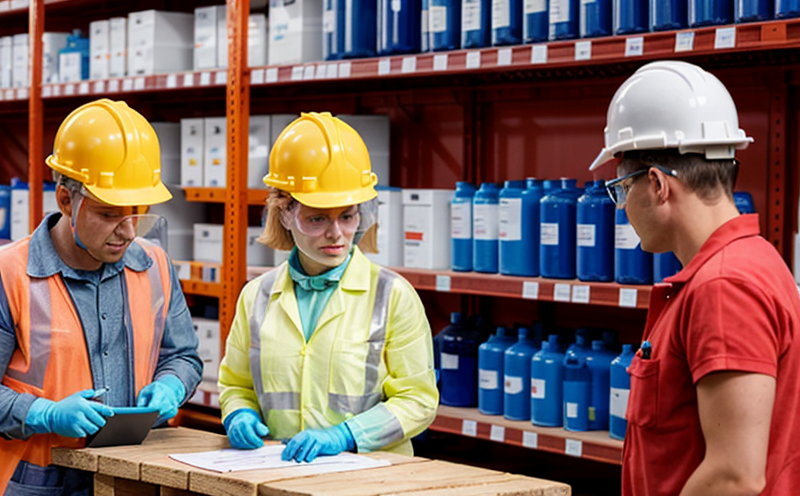Certification for Safety in Chemical Products: Ensuring Consumer Protection
The chemical industry is a vital sector that contributes significantly to the global economy. However, the production and distribution of chemical products pose a significant risk to human health and the environment if not handled properly. To mitigate these risks, regulatory bodies worldwide have established standards and guidelines for the certification of safety in chemical products.
What is Certification for Safety in Chemical Products?
Certification for safety in chemical products refers to the process of verifying that a product meets specific safety standards and regulations set by governing authorities. This involves conducting thorough testing and evaluation of the products composition, labeling, packaging, and handling procedures to ensure they do not pose any hazards to humans or the environment.
Importance of Certification for Safety in Chemical Products
The importance of certification for safety in chemical products cannot be overstated. With millions of people exposed to chemicals every day, even a small mistake can have catastrophic consequences. Some of the key reasons why certification is essential include:
Compliance with Regulations: Compliance with regulations and standards set by governing authorities such as OSHA (Occupational Safety and Health Administration), EPA (Environmental Protection Agency), and REACH (Registration, Evaluation, Authorization, and Restriction of Chemicals) in Europe. These regulations ensure that chemical products are manufactured, handled, and disposed of safely.
Consumer Trust: Certification for safety in chemical products helps build trust between manufacturers and consumers. When a product is certified, customers can be assured that the product has been tested and meets specific standards for safety.
Key Aspects of Certification for Safety in Chemical Products
While certification requirements may vary depending on the country or region, there are several key aspects that manufacturers must consider:
Material Safety: The safety of materials used in the manufacturing process is critical. Manufacturers must ensure that all raw materials are handled and processed safely to prevent exposure to hazardous substances.
Handling and Storage: Proper handling and storage procedures must be followed to prevent accidents and spills.
Labeling and Packaging: Clear labeling and packaging instructions must be provided to ensure consumers use products safely.
Disposal: Manufacturers must provide guidelines for safe disposal of chemical products, including containers and packaging materials.
Benefits of Certification for Safety in Chemical Products
The benefits of certification for safety in chemical products are numerous:
Enhanced Credibility: Certification demonstrates a commitment to customer safety and can enhance the manufacturers credibility.
Increased Sales: Certified products may have an advantage over non-certified products, potentially leading to increased sales.
Risk Reduction: Certification reduces the risk of accidents, injuries, and environmental damage associated with chemical products.
Examples of Certifications for Safety in Chemical Products
There are several certifications that manufacturers can obtain to demonstrate their commitment to safety:
OSHA Certification: The OSHA certification is a widely recognized standard that ensures compliance with workplace safety regulations.
EPA Registration: Manufacturers must register with the EPA to ensure compliance with environmental regulations.
REACH Compliance: REACH is a comprehensive framework for registering, evaluating, and restricting chemical substances in Europe.
Challenges Facing Certification for Safety in Chemical Products
Despite the importance of certification for safety in chemical products, several challenges face manufacturers:
Regulatory Complexity: Regulatory requirements can be complex and time-consuming to navigate.
Cost: Obtaining certifications can be expensive, especially for small or medium-sized enterprises.
Staying Up-to-Date: Regulations and standards are constantly evolving; manufacturers must stay up-to-date with changing requirements.
Conclusion
Certification for safety in chemical products is a critical step towards ensuring consumer protection. Manufacturers that prioritize certification demonstrate their commitment to customer safety and may enjoy increased credibility, sales, and reduced risk.
QA Section: Additional Information on Certification for Safety in Chemical Products
1. What is the difference between voluntary and mandatory certifications?
Voluntary certifications are optional and usually sought by manufacturers who want to demonstrate their commitment to safety beyond regulatory requirements. Mandatory certifications are required by law or regulation and ensure compliance with specific standards.
2. Can certification be obtained after a product has been manufactured?
In some cases, yes. Manufacturers can retroactively obtain certification for products already on the market. However, this may not always be possible, especially if the product does not meet current regulatory requirements.
3. How long is certification typically valid for?
Certification periods vary depending on the type of product and regulation. Some certifications are valid for a few years, while others require periodic renewal or recertification.
4. Can certification be obtained through third-party testing labs?
Yes. Third-party testing labs can perform tests and evaluations to verify compliance with specific standards. However, manufacturers must still ensure that their products meet regulatory requirements.
5. What are the consequences of non-compliance with safety regulations?
Non-compliance with safety regulations can result in fines, penalties, product recalls, damage to reputation, and even lawsuits.
6. How does certification impact product liability?
Certification can demonstrate a manufacturers commitment to customer safety, potentially reducing the risk of product liability claims.
7. Can small or medium-sized enterprises (SMEs) obtain certification?
Yes. SMEs can obtain certification through various programs designed specifically for smaller manufacturers. These programs often offer more flexible and cost-effective solutions.
8. What role do third-party auditors play in certification?
Third-party auditors conduct on-site audits to verify compliance with specific standards. Their findings are used to determine whether a manufacturer meets certification requirements.
9. Can certification be obtained for products that have not yet been manufactured?
Yes. Manufacturers can obtain certification for products still in the design or prototype phase, as long as they provide documentation demonstrating their commitment to safety and compliance with regulatory requirements.
10. What are some common misconceptions about certification for safety in chemical products?
Some common misconceptions include thinking that certification is solely a cost-effective measure or that it can be easily obtained without significant effort or resources.

































